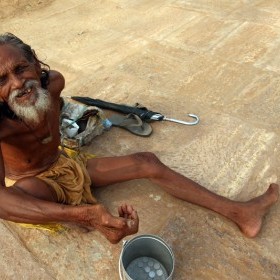
India’ s worst economic crisis is at its doors. Indian government prepares to take serious monetary measures to dodge its biggest financial crisis as rupee suffered its worst devaluation this week.
New Delhi / NationalTurk – India ‘s contingency plan to avoid the looming economic crisis might be set but after witnessing the sharpest drop of India ‘s rupee this week, experts report India has to deal with its worst economical crisis ever. Interest rates could be cut, market stabilisation fund set up, Indian Finance Ministry officials are looking at different scenarios on how to avoid the financial crisis that destroyed European economics.
Rupee ‘s drop can overwhelm Indian economy
The sharp drop in rupee against US dollar has triggered severe concern among Indian economists who claim the Indian finance sector might endure significant challenges in near future if Rupee ‘s free fall cannot be hindered.
Indian government found its way out of the 2008 financial crisis by increasing investments on job-creating infrastructure projects and tax cuts that boosted consumer spending a major driver of every open economy.
Experts claim that India was not largely affected by the global recession and financial crisis of 2008. ‘ Even after global financial crisis, India looked set to chase high returns through foreign and domestic investments to sustain its pre-crisis growth at 9 %,’ state the finance gurus of the country.
However mega scams including 3G together with rising interest rates, high inflation and policy paralysis on the part of the Indian government, has shaken the investor confidence and shattered India’s growth plans.
Euro zone crisis arrives in India 2012, already dampered India’s exports to Europe
The euro zone debt crisis has already put a damper on India’s exports to Europe, the biggest destination for Indian goods, as well as capital inflows into equity and debt markets. Indian Prime Minister Manmohan Singh’s government blames Europe’s woes for the slowdown although economists claim Indian policy inertia is also a factor to blame in Asia’s third-biggest economy
Finance chiefs of the Group of Seven leading industrialised powers will hold emergency talks on the euro zone crisis on Tuesday in what was seen as a sign of growing global alarm over the threat posed by the strains within the 17-nation union.
According to experts, the fall in the rupee has bloated the size of oil import bill for India forcing the Indian government to hike the petrol prices by a steep Rs 7.54 per litre on May 23; the prices were reduced by Rs 2 after some days.
Investors shy about putting their money on Indian market
Economy experts stated that the reason behind low investment could only be attributed to the volatile financial environment that doesn’t inspire confidence in global and domestic investors to put their money in the Indian market.
Experts add if the fall in the rupee continues, there could be many more price hikes of petrol in the immediate future. ‘ Even the Indian government could go for decontrol of diesel, LPG and kerosene,’ they say.
This time around, with the budget deficit at nearly 6 percent of GDP, thanks in no small part to that stimulus spending, it does not have the same room to evolvement.
‘ It is known that India does have a contingency plan against the economic crisis. There are different crisis management groups within the Indian government to deal with such a possible scenario,’ Kaushik Basu, the chief economic adviser to Indian Finance Minister Pranab Mukherjee.
Measures India has to take to avoid finance crisis 2012
The economic adviser declined to give details of the crisis management plan, but another senior official familiar with the planning of economy saving process mentioned the Finance Ministry and central bank were prepared to take monetary measures if necessary to insulate India from the shockwaves of a euro zone collapse, which can have drastic consequences as India’s population is walking on the fringes of 2 billions of people.
The measures India is preparing against the looming finance crisis include lowering interest rates, which are among the highest in the world, and lowering the amount of money that Indian banks have to keep on deposit in the central bank.
The latter step would allow Indian banks to lend more money to firms to keep hiring and expanding. The banks are required to keep 4.75 % of their deposits with the Reserve Bank of India says the Indian law.
‘ We are already preparing technical analysis for different possible scenarios that could impact India trade, stock markets and financial institutions,’ the Finance Ministry official said, speaking on condition of anonymity because of the sensitivity of the issue.
“We are facing a fast-evolving situation. The question is not only about the exit of Greece from the euro zone, but whether the euro zone will be able to hold as a fiscal entity,” he said.
Indian Government : Next G20 meeting is crucial for all of us
Finance Ministry officials state the wider group of G20 major economies, of which India is a leading member, were not planning their own conference call to discuss the economic crisis 2012 but were preparing instead for their summit in Mexico on June 18-19.
‘ The next G20 meeting … is going to be a major signal to the globe that we are all together and that the governments will try to sort out the crisis ridden economies, the senior official expressed.
The Indian government is also banking on lower international oil prices, to support blunt the impact of any European crisis. India imports nearly 80 % of its oil requirements and heavily subsidizes diesel and kerosene that is used mainly by the India’s poor and troubled public transport.
[adrotate banner=”41″]
